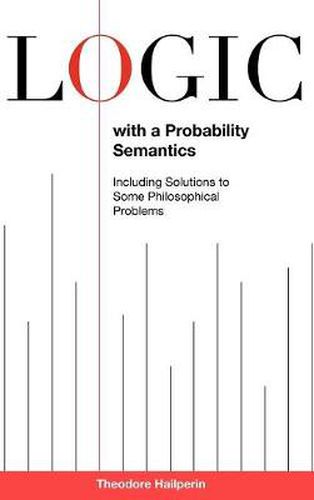Readings Newsletter
Become a Readings Member to make your shopping experience even easier.
Sign in or sign up for free!
You’re not far away from qualifying for FREE standard shipping within Australia
You’ve qualified for FREE standard shipping within Australia
The cart is loading…






The present study is an extension of the topic introduced in Dr. Hailperin’s Sentential Probability Logic, where the usual true-false semantics for logic is replaced with one based more on probability, and where values ranging from 0 to 1 are subject to probability axioms. Moreover, as the word sentential in the title of that work indicates, the language there under consideration was limited to sentences constructed from atomic (not inner logical components) sentences, by use of sentential connectives ( no,
and,
or, etc.) but not including quantifiers ( for all,
there is ).
An initial introduction presents an overview of the book. In chapter one, Halperin presents a summary of results from his earlier book, some of which extends into this work. It also contains a novel treatment of the problem of combining evidence: how does one combine two items of interest for a conclusion-each of which separately impart a probability for the conclusion-so as to have a probability for the conclusion based on taking both of the two items of interest as evidence?
Chapter two enlarges the Probability Logic from the first chapter in two respects: the language now includes quantifiers ( for all, and there is ) whose variables range over atomic sentences, not entities as with standard quantifier logic. (Hence its designation: ontological neutral logic.) A set of axioms for this logic is presented. A new sentential notion-the suppositional-in essence due to Thomas Bayes, is adjoined to this logic that later becomes the basis for creating a conditional probability logic.
Chapter three opens with a set of four postulates for probability on ontologically neutral quantifier language. Many properties are derived and a fundamental theorem is proved, namely, for any probability model (assignment of probability values to all atomic sentences of the language) there will be a unique extension of the probability values to all closed sentences of the language.
$9.00 standard shipping within Australia
FREE standard shipping within Australia for orders over $100.00
Express & International shipping calculated at checkout
Stock availability can be subject to change without notice. We recommend calling the shop or contacting our online team to check availability of low stock items. Please see our Shopping Online page for more details.
The present study is an extension of the topic introduced in Dr. Hailperin’s Sentential Probability Logic, where the usual true-false semantics for logic is replaced with one based more on probability, and where values ranging from 0 to 1 are subject to probability axioms. Moreover, as the word sentential in the title of that work indicates, the language there under consideration was limited to sentences constructed from atomic (not inner logical components) sentences, by use of sentential connectives ( no,
and,
or, etc.) but not including quantifiers ( for all,
there is ).
An initial introduction presents an overview of the book. In chapter one, Halperin presents a summary of results from his earlier book, some of which extends into this work. It also contains a novel treatment of the problem of combining evidence: how does one combine two items of interest for a conclusion-each of which separately impart a probability for the conclusion-so as to have a probability for the conclusion based on taking both of the two items of interest as evidence?
Chapter two enlarges the Probability Logic from the first chapter in two respects: the language now includes quantifiers ( for all, and there is ) whose variables range over atomic sentences, not entities as with standard quantifier logic. (Hence its designation: ontological neutral logic.) A set of axioms for this logic is presented. A new sentential notion-the suppositional-in essence due to Thomas Bayes, is adjoined to this logic that later becomes the basis for creating a conditional probability logic.
Chapter three opens with a set of four postulates for probability on ontologically neutral quantifier language. Many properties are derived and a fundamental theorem is proved, namely, for any probability model (assignment of probability values to all atomic sentences of the language) there will be a unique extension of the probability values to all closed sentences of the language.